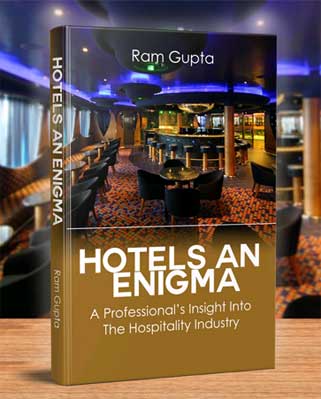
Consumers are the heart and soul of the hospitality industry and they’re becoming smarter, savvier, and more demanding with each passing day. To keep their guests happy and satisfied, hotels must give serious thought to building long lasting customer relationship. This way, their guests not only leave with a favorable impression of the establishment, but also become its brand ambassadors in their day to day life.
All industries around the world are undergoing a lot of change, and the hospitality industry isn’t immune to it. Continuous technological innovation plays a major role, since it allows consumers to access information about any service or establishment within a matter of minutes. Then there is social media, which, not only permeates every industry, but also has the power to change trends and shape the future.
It is no surprise, then, that consumer expectations have also increased. Gone are the days where advertising was taken at face value. We no longer have to resort to dated practices designed to collect only leads, enquiries, or hits. Today, the focus is on consumer retention and building loyalty.
The hospitality industry, especially, thrives on this approach. After all, isn’t customer service everything here? Reputations hinge on popular perception, goodwill, and word of mouth. The hotel experience can be tarnished irreparably if it gets even the tiniest detail wrong about its guests, who are not averse to using social media to voice their grudges.
CRM (Customer Relationship Management) hinges on the belief that building a consistent, sustainable user base is far more valuable for the business than indulging in fickle marketing practices. It also takes into account three key things in its more comprehensive form: People, processes, and technology. As the industry thrives on segmentation and uniqueness, the ‘persona’ of the hotel can only be as distinct as their consumer relationships enable them to be.
This becomes even more relevant when you consider the cutthroat competition in the hospitality industry. Unless you put customer relationship at the center of all your planning and strategizing, you’ll find your audience striking your brand off their list. Then, there are other factors, like growing customer-acquisition costs, rising customer expectations, price-sensitive travellers, more sophisticated clients, an uncertain market, and decreasing brand loyalty – all of which make Consumer Relationships a focus area.
Good CRM and Solid Identity
To enhance customer relations, you need to first start working at the base, which is your brand identity. If your brand comes across as vague or undefined, your consumers are unlikely to listen to what you have to say in the first place. Your identity should be partly eternal (core values, long term mission and so on), but it should also adapt according to context.
For example, millennials look for a brand that effectively uses current trends in their advertising, or a brand that is socially aware and takes steps in that direction when their services are used. They look for services that are enabled by technology and a wide range of interfaces. In this environment, if you appear traditional and antiquated, you may be falling grossly short of their expectations.
Identifying your core demographic is primary. Then, you need to create a story and tonality for the brand itself, so that you can mould a concrete identity. This needs to align with your core values and company culture, because the way you treat your own employees reflects greatly on the kind of service they provide to the consumers. From then on, creating a healthy buzz about your brand on social media, keeping your audience updated about the latest in your hotel, encouraging reviewers, and addressing their concerns will become more seamless.
Happy Employees and Work Culture
The hospitality industry needs to stress on employee happiness to improve consumer relationships. If your staff and other employees treat hospitality as a chore, or are driven only by fear and authority, they are hardly going to treat guests with warmth and exuberance.
Hotels are also engaging in trait-based hiring, rather than simply relying on technical skills. What this means is that you need to hunt for people who find immense value in being hospitable to others. Personalities are harder to acquire, technical skills not so much.

For example, take the whole process of checking in. The ‘service’ aspect is simple enough. The guest comes in, is asked for his/her ID, and then their keys are handed to them. Now, in this scenario, the receptionist can rattle off all those scripted lines they’ve picked up during training, but their demeanour, mannerism, the genuineness with which they interact with the guest matters a lot. This is where their innate characteristic of being warm and friendly shines through.
An unhappy employee with a script can be damaging. Consumers are extremely smart and savvy these days and can smell fake hospitality a mile off. If your staff provides only scripted service, your guests will be put off. To set yourself apart from other establishments out there, train your employees to understand the value of emotion, warmth, and caretaking.
But this cannot be achieved if they themselves are working in a stifling work environment. So, don’t forget to nurture your employees with the same warmth and consideration that you’d want them to extend to the guests in the hotel.
Technological Help
Fostering a good relationship with your consumers means that you will match, and exceed consumer expectations at every point. Matching expectations is significantly easier for brands that have a strong presence with a set standard of service, but that just doesn’t cut it anymore. Consumers are actively seeking out better experiences, and like we said before, the same old cookie cutter offerings and amenities holds no value for them at all.
So how can you direct consumer behaviour? By implementing the right tools and technologies, of course. Analytics software is especially potent in this regard. Analytics can help you determine the following things and more:
- Customer Demographic
- Guest responses to specific services
- Consumer interests in the current context
- Distribution
- Transactional Activity
This means you can identify exactly what the guests like and customize your services accordingly. In fact, personalization is THE key to differentiation in an already inundated market. Marketing campaigns also succeed if they’re highly segmented and targeted. Even pricing strategies can be manipulated, like the Marriott has been doing. They used analytics and customer feedback to rearrange their rooms according to the type of traveller that would stay there - leisure, business, or even families - where more storage space was provided. They also armed their front desk with smartphones and tablets so that they could know what to expect from customers along with their requirements.
Consumer relationships are also cemented with the help of loyalty programs. However, most hotels don’t provide programs that cater to the guest’s requirements, because the don’t know what in particular will increase retention. With analytics, you can do all this and more, so definitely consider including it in your marketing strategy.
Another thing to examine is split testing – you can use a sandbox to test out your potential campaigns and determine their efficacy before implementing them on a large scale. It always helps to have foresight so that you don’t do damage control later – with fora like TripAdvisor and Lonely Planet, even one mistake might dent your reputation considerably.
Getting in Touch, and Extraneous Elements
Any interpersonal relationship requires communication that is open, and transparent. More importantly, it should be consistent. This goes for your customers, too, especially in a service-heavy industry like hospitality.

When you talk communication, you must discuss mobile – because mobile is the most predominant channel that is used today. According to WOW Local Marketing, 52% of customers are less likely to engage with the company because of a bad mobile experience. That’s more than half of them, who are probably spreading the word about your ineptitude. Furthermore, 55% of customers focus on your website experience to formulate their opinions – so scalability for both the mobile and web matter.
Customers would also like more transparent channels to communicate, and will appreciate as little redirection as possible. Remember that time you had to go through at least five representatives to solve a simple query? And remember you frustrated you got, but you had to grit and bear it all the same? Well, don’t make your customers go through a similar experience, because you don’t want them to take back negative memories of their stay with you.
Empowering your employees with the power to make decisions is something I want to stress on particularly here. The more able they are when it comes to solving the guest’s problems without having to redirect them or seek permission from their bosses, the more assured the guest will be – and will surely return, owing to the efficiency of your employees.
Communication channels also need to extend to collecting reviews and addressing concerns on the fly. The guest or consumer may provide critical feedback, which you will need to address immediately. If they think their opinions and queries are disappearing into a void, well .... that’s exactly where your business might be headed too.
Lastly, take a look at your activities in the local community. If you engage in activities that address social issues and give back to the community, the image of your brand is bolstered considerably. The guest will not only look at your brand from a utilitarian perspective, they will also feel better because they chose you, and not another dispassionate establishment that shows no responsibility towards the society at all.
In the end, we all know that strengthening customer relationships is not an overnight activity. It requires patience, timed responses, improvisation and an accurate reading of the industry in order to be effective. However, if done right, it can take your brand way beyond the conventional players in the hospitality industry.
Ram Gupta is a hotel management graduate from India and Germany; He is a certified Hotel Administrator from U.S. and MIH from U.K. He has over 40 years of sound experience in the industry in India, Dubai, U.K and Europe. He has been associated with over two dozen luxury and boutique hotel projects and has launched two hotel chains in India. He is currently an independent hotel consultant and could be contacted at ramgupta@bcgglobal.com. Website: www.bcgglobal.com

Releasing soon on Amazon and city book stores